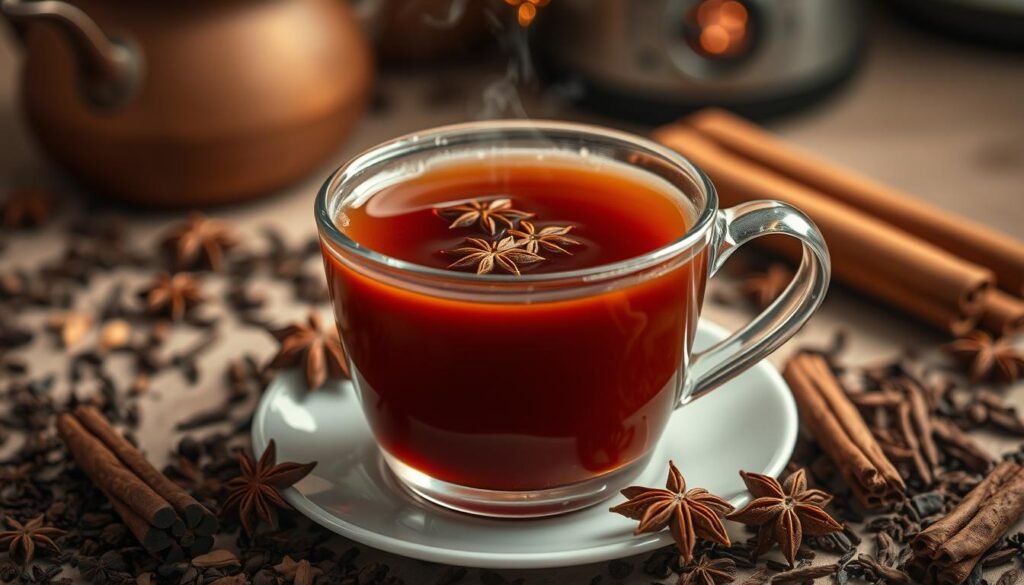Chai tea is a mix of black tea and spices that many love. But, does it have caffeine? We’ll look into chai’s history, caffeine’s role, and how it affects the tea’s caffeine level in this guide.

Key Takeaways
- Chai tea usually has caffeine because of its black tea base. But, the amount can change based on the tea type and how it’s brewed.
- A chai latte has less caffeine than coffee but more than herbal teas. It has about 40-70 mg of caffeine per serving.
- Traditional chai made with black tea has caffeine. Herbal chai, on the other hand, might not have any.
- Chai gives a slow energy boost. This is different from the quick energy and crash that coffee can cause.
- Decaffeinated chai is a good choice for those who don’t want caffeine or are sensitive to it.
Understanding Chai Tea: Origins and Traditional Components
Chai tea has a long history, starting thousands of years ago in India. It began as masala chai, a spiced tea for health, thanks to an Indian king. This blend included ginger, cardamom, cloves, cinnamon, and black pepper.
The Ancient Roots of Masala Chai
At first, masala chai didn’t have black tea leaves. But in the mid-1800s, adding black tea, milk, and sweeteners became popular. This mix of spices and tea made chai tea famous around the world.
Essential Spices in Traditional Chai
- Cardamom
- Cinnamon
- Ginger
- Cloves
- Black pepper
The spice mix, or “masala,” changes a lot by region and culture. This variety creates the unique tastes of chai tea.
The Role of Black Tea Base
The spice mix is key, but black tea adds caffeine. Assam and Darjeeling teas are common. But, recipes can also use green teas, yerba mate, or herbal blends, changing the flavor.

The mix of spices and black tea gives chai its special taste. It’s a comforting drink loved by many around the world.
Does Chai Tea Have Caffeine
Yes, chai tea usually has caffeine. This comes mainly from the black tea base in most chai blends. But, the caffeine amount can change based on the tea type, brewing time, and how it’s made. Some chai might use green tea or herbs, which can change the caffeine level.
A typical cup of chai tea has about 40mg of caffeine (4 oz of black tea). This is less than the 120mg in an average cup of coffee. So, chai tea has about one-third the caffeine of coffee. The caffeine in chai tea makes you feel calm and focused, unlike coffee’s sudden jolt.
| Beverage | Caffeine Content |
|---|---|
| Chai Tea | 50-100mg per cup |
| Coffee | 120mg per cup |
The caffeine in chai tea can vary. It depends on the blend and how it’s made. The type of black tea, brewing time, and added ingredients like milk and sweeteners can also affect the caffeine level.

Many people like chai tea for its unique taste. The spices like cinnamon, cloves, ginger, and cardamom make it special. Chai tea’s energy boost is also preferred over coffee’s quick rise and fall.
The Science Behind Caffeine Content in Chai Tea
Chai tea is a favorite drink that mixes black tea with spices. It has a special caffeine level that many find interesting. To get to the bottom of chai’s caffeine, we must look at the science behind it.
Chemical Properties of Caffeine in Tea
Caffeine is a natural stimulant in tea leaves, especially in black tea. The amount of caffeine in your cup depends on the tea quality, water temperature, and how long it steeps. Black tea usually has the most caffeine compared to green or white tea.
How Caffeine Interacts with Chai Spices
The spices in chai, like cinnamon and ginger, can affect how caffeine is processed in the body. Research shows that some spices might slow down caffeine absorption. This could make chai tea’s energy boost last longer.
For instance, ginger might slow down caffeine absorption. This could give you a steady energy boost. Cinnamon’s anti-inflammatory effects might also help reduce caffeine jitters.
Understanding these interactions helps us see why chai tea is special. It offers a unique caffeine experience that’s both enjoyable and fascinating for those who love caffeine.

| Beverage | Caffeine Content (per 8 oz serving) |
|---|---|
| Coffee | 95-200 mg |
| Chai Tea Latte | 25-70 mg |
| Masala Chai | 30-70 mg |
| Green Tea | 20-45 mg |
| Oolong Tea | 30-50 mg |
Comparing Chai Tea Caffeine Levels to Coffee
Chai tea and coffee have different amounts of caffeine. A cup of coffee usually has about 95 mg of caffeine. On the other hand, a chai latte has 40 to 70 mg of caffeine. This shows that chai tea and coffee have different caffeine levels.
The amount of caffeine in chai tea can change. It depends on the type of tea, how it’s brewed, and if it has milk or sugar. Black tea-based chai usually has less caffeine than coffee. But, some chai teas, like green tea or herbal blends, might have more caffeine.
| Beverage | Caffeine Content (mg) |
|---|---|
| Cup of Coffee | 95 |
| Chai Latte | 40-70 |
If you want less caffeine, try decaffeinated chai tea. It’s a caffeine-free option. Herbal chai, made with rooibos or chamomile, is also good for those who don’t want caffeine.
Choosing between chai tea vs. coffee depends on what you like and your diet. Knowing the caffeine levels helps you pick the best choice for you. This way, you can enjoy the taste and benefits of both.

Starbucks Chai Tea Latte: Caffeine Content Analysis
The caffeine in Starbucks’ Chai Tea Latte is a bit complex. Chai tea has caffeine from black tea, but the amount changes with size and recipe.
Standard Recipe Specifications
Starbucks uses a strong chai tea blend in their latte. This might make it have more caffeine than homemade versions. A 16 fl oz (Grande) drink has about 95 mg of caffeine.
Size Variations and Caffeine Levels
- Tall (12 fl oz) Chai Tea Latte: ~70 mg of caffeine
- Grande (16 fl oz) Chai Tea Latte: ~95 mg of caffeine
- Venti (20 fl oz) Chai Tea Latte: ~120 mg of caffeine
Customizing your drink can also change the caffeine level. Starbucks offers many milk choices, including dairy-free options, for different tastes.
| Starbucks Chai Tea Latte | Caffeine (mg) | Sugar (g) | Calories |
|---|---|---|---|
| Tall (12 fl oz) | 70 | 32 | 190 |
| Grande (16 fl oz) | 95 | 44 | 240 |
| Venti (20 fl oz) | 120 | 53 | 310 |
Knowing the caffeine in Starbucks’ Chai Tea Latte helps you manage your caffeine intake. You can pick the size that fits your caffeine needs and taste preferences.

Factors Affecting Caffeine Content in Chai Tea
The caffeine in chai tea can change a lot. It depends on the tea type, how much is used, and how it’s brewed. Even the water temperature matters.
First, the tea type is key. Black tea has 40 to 70 milligrams of caffeine per 8-ounce cup. Green tea has 25 to 35 milligrams, and white tea has 15 to 30 milligrams. So, black tea in chai means more caffeine than green or herbal teas.
How you brew it also affects caffeine. Longer steeping and hotter water get more caffeine out. The tea to water or milk ratio also matters. Milk in chai lattes can make the caffeine less strong.
Lastly, the chai mix and extra ingredients like spices or sweeteners can change caffeine levels. Rooibos chai tea has no caffeine. Herbal chai blends might have different caffeine levels.
So, the caffeine in chai can really vary. Knowing these factors helps you make your chai just right. You can get the caffeine level you prefer.
Different Types of Chai Tea and Their Caffeine Levels
Chai tea comes in many flavors, each with its own caffeine level. From traditional black tea to herbal options, knowing the caffeine content helps you choose.
Traditional Black Tea Base
The classic chai tea is made with black tea, which has 14 to 70 mg of caffeine per 8 oz. This range changes based on the tea leaves, how much is used, and the brewing method. Brands like Pacific Chai, Oregon Chai, and Big Train Chai usually have about 65-67 mg of caffeine per 8 oz cup.
Green Tea Chai Variations
Green tea chai is a good choice for those who want less caffeine. It has 24 to 40 mg of caffeine per 8 oz. Teavana Oprah Chai and Tazo Chai are examples of brands in this range.
Herbal Chai Alternatives
Herbal chai blends are perfect for those who want no caffeine. They use ingredients like rooibos and honeybush. These teas are caffeine-free and offer a calming experience.
The caffeine in chai tea can differ a lot between brands and how it’s made. Always check the product information to know the caffeine level in your chai tea.
| Chai Tea Variety | Caffeine Content (per 8 fl oz) |
|---|---|
| Pacific Chai | 67 mg |
| Oregon Chai | 66 mg |
| Big Train Chai | 65 mg |
| Lipton Chai | 30 mg |
| Teavana Oprah Chai | 25 mg |
| Tazo Chai | 47 mg |
“Chai tea is a unique and flavorful beverage that can be enjoyed in a variety of ways, each with its own caffeine profile to suit your preferences.”
How Brewing Methods Impact Caffeine Extraction
The way you brew chai tea greatly affects its caffeine content. The longer the tea steeps, the more caffeine it absorbs. Most caffeine is pulled out in the first 3-5 minutes. So, steeping for longer can make your tea more caffeinated.
The water’s temperature also matters. Hot water pulls out caffeine faster than cold water. The amount of tea to water and whether you use loose leaves or tea bags also changes the caffeine level.
Knowing these details lets you control your chai tea’s caffeine. Try different brewing times and water temperatures. This way, you can get the caffeine and flavor you like best.
| Brewing Factor | Impact on Caffeine Extraction |
|---|---|
| Steeping Time | Longer steeping increases caffeine content, with most caffeine extracted within 3-5 minutes. |
| Water Temperature | Hotter water extracts caffeine more quickly than cooler water. |
| Tea Leaf to Water Ratio | Higher tea leaf to water ratio can result in higher caffeine levels. |
| Loose Leaf vs. Tea Bags | Loose leaf tea generally allows for more complete caffeine extraction compared to tea bags. |
Mastering chai tea brewing lets you make the perfect energizing cup. Try out different methods to find what you like best.
“The perfect cup of chai tea is a delicate balance of flavors, aromas, and just the right amount of caffeine to power your day.”
Caffeine-Free Chai Options for Sensitive Consumers
For those who can’t handle caffeine, there are many tasty chai options without it. These teas use a black tea base that’s been decaffeinated. This way, they keep the flavors of chai but cut down on caffeine’s effects.
Decaffeinated Chai Varieties
Decaffeinated chai teas are perfect for those watching their caffeine intake. They use black tea that’s been decaffeinated gently. This keeps the chai spices like cinnamon and ginger in, but with almost no caffeine.
Herbal Chai Blends
Herbal chai blends are another great choice for those avoiding caffeine. They use herbs and spices like rooibos and ginger. These blends offer the bold taste of chai without any caffeine.
Choosing decaf black tea chai or herbal blends meets the needs of those who want less caffeine. There’s a wide range of options. This way, you can enjoy the flavors of chai without worrying about caffeine.
Health Benefits of Chai Tea Beyond Caffeine
Chai tea is more than just a drink; it’s a treasure trove of health benefits. The spices like ginger, cinnamon, and cardamom in traditional chai are packed with anti-inflammatory and antioxidant powers.
Black tea, the main ingredient in most chai, is full of polyphenols. These compounds may help your heart and boost your metabolism. Research shows that the mix of caffeine and L-theanine in tea can also improve your brain function and lower stress.
- Black tea has been linked to a lower risk of high blood pressure, heart failure, and stroke.
- Drinking black tea might also lower “bad” cholesterol in people with high cholesterol.
- Cardamom, a key spice in chai, could help lower blood pressure and cholesterol.
Black tea may also reduce the risk of some cancers, like ovarian, breast, and liver cancer. It can improve your memory, focus, and brain processing skills.
The spices in chai, including ginger, cinnamon, and clove, have strong anti-inflammatory effects. They can fight chronic inflammation diseases. Cinnamon, in particular, is full of antioxidants and anti-inflammatory compounds.
“The synergistic combination of spices and tea in chai is thought to enhance the health benefits of the beverage.”
But, drinking too much chai tea can cause sleep problems and high blood sugar. To enjoy it healthily, use fresh water, choose quality tea and spices, and sweeten with natural sweeteners. Pick the right milk for creaminess.
Best Times to Drink Chai Tea for Optimal Benefits
Chai tea is great at any time of day. It’s perfect for a morning energy boost. Its mix of black tea and spices gives a gentle caffeine kick, unlike coffee.
Morning Energy Boost
Starting your day with chai tea is a great idea. It combines caffeine from black tea with the calming effects of spices like cardamom and cinnamon. This mix gives you a smooth energy boost to start your day.
Drinking chai tea 30 minutes after waking up is best. It matches your body’s natural energy cycle. This helps you stay focused and alert.
Afternoon Pick-Me-Up Options
When you feel tired in the afternoon, chai tea is a great choice. Its mix of caffeine and spices keeps you alert without the jitters. A chai tea latte or cold-brewed chai in the afternoon is refreshing.
But, think about how caffeine affects you when drinking chai tea later. If you’re sensitive to caffeine, try decaf or herbal chai at night. This helps avoid sleep problems.
The best time to drink chai tea is when it feels right for you. Try different times and ways to make it. Find the perfect chai tea moment that suits your energy and taste.
Common Myths About Chai Tea and Caffeine
There are many wrong ideas about chai tea and its caffeine. One big myth is that chai lattes have coffee in them. But, this is only true if someone adds coffee to it. Real chai is made with black tea, not coffee.
Another myth is that all chai tea has a lot of caffeine. But, the truth is different. The caffeine in chai can change a lot. It depends on the tea type, how it’s brewed, and the ingredients used. Black tea chai has more caffeine, but some blends with green or herbal teas have less.
Some people think milk in chai lowers its caffeine. But, that’s not entirely right. Milk doesn’t cut down the caffeine amount. It just makes the caffeine less strong in each sip.
- Chai lattes do not contain coffee unless it is specifically added to the drink.
- Caffeine levels in chai can vary widely, depending on the tea base and preparation method.
- Adding milk to chai only dilutes the caffeine concentration, not the total amount of caffeine.
Knowing these facts helps people choose chai wisely. It helps them avoid wrong ideas about its caffeine.
Making the Perfect Cup of Chai Tea at Home
Making homemade chai tea is easy and fun. It’s all about using the best ingredients and following a few steps. Start by picking your favorite black tea and some spices like cardamom, cinnamon, ginger, and cloves.
First, boil the spices in water for 5-10 minutes. This lets the spices flavor the water well. Then, add your black tea and let it steep for 3-5 minutes, depending on how strong you like it.
- Simmer the spices (cardamom, cinnamon, ginger, cloves) in water for 5-10 minutes to extract maximum flavor.
- Add high-quality black tea leaves and steep for 3-5 minutes for optimal caffeine extraction and flavor.
- Stir in milk and sweetener (such as honey or brown sugar) to taste.
- Experiment with different spice combinations to find your ideal homemade chai tea recipe.
To make it stronger, use more tea leaves or steep it longer. Try different spice mixes to find your favorite chai recipe. Finally, add milk and sweetener like honey or brown sugar for a cozy cup of chai.
| Ingredient | Quantity |
|---|---|
| Water | 2 cups |
| Whole Milk | 1 cup |
| Black Tea Leaves | 2 teaspoons |
| Cardamom Pods | 4 |
| Cinnamon Stick | 1 |
| Fresh Ginger, grated | 1 teaspoon |
| Fennel Seeds | 1 teaspoon |
| Granulated Sugar | 2 teaspoons |
Enjoy your homemade chai tea and the rich, aromatic flavors it brings. It’s like a trip to India in every sip.
Who Should Monitor Their Chai Tea Caffeine Intake
Chai tea is loved for its taste and health perks. But, some folks need to watch their chai tea drinking because of caffeine. Pregnant women, those who are sensitive to caffeine, and people with certain health issues should be careful.
Pregnancy Considerations
Pregnant women should not have more than 200 milligrams of caffeine a day. A typical chai tea cup has 40-50 milligrams of caffeine. So, pregnant women might need to keep an eye on how much chai tea they drink. It’s best to talk to a doctor about how much caffeine is okay during pregnancy.
Sensitivity and Health Conditions
People who are sensitive to caffeine or have health issues like anxiety or sleep problems should be careful with chai tea. Caffeine can make symptoms worse for these conditions. It’s key to notice how chai tea affects you and adjust your drinking accordingly. If you have heart or blood pressure issues, check with your doctor about caffeine, including from chai tea.
Knowing about chai tea’s caffeine and being aware of your needs lets you enjoy its taste while staying healthy. It’s all about finding the right balance for you.
Conclusion
Chai tea usually has caffeine because it’s made with black tea. But, the amount can change a lot. This depends on the mix, how it’s made, and how much you drink.
Even though chai tea has less caffeine than coffee, it’s special. It has a mix of spices that might be good for you too.
Knowing what affects chai tea’s caffeine is key. This includes the type of tea, how it’s brewed, and if it’s store-bought or homemade. This knowledge helps you choose the right chai for you.
Whether you want a caffeine kick or something without it, knowing about chai tea caffeine summary, understanding chai caffeine content, and making informed chai choices is important. It lets you pick the perfect chai for your taste and needs.
Chai tea is loved for its variety and rich flavors. By paying attention to caffeine levels, you can enjoy its taste and possible health perks. This makes it a great choice for those who love trying new things.
FAQ
Does chai tea have caffeine?
Yes, chai tea usually has caffeine because it’s made with black tea. The amount of caffeine can change based on the tea type, how long it’s brewed, and how it’s made.
What is the source of caffeine in chai tea?
The caffeine in chai tea comes from the black tea it’s made with. The amount of caffeine can differ based on the tea blend and how it’s brewed.
How does the caffeine in chai tea compare to coffee?
Chai tea has less caffeine than coffee. A coffee cup has about 95 mg of caffeine. A chai latte might have 40-70 mg. The exact difference depends on the size, brewing method, and blend.
How much caffeine is in a Starbucks Chai Tea Latte?
A 16 fl oz (Grande) Starbucks Chai Tea Latte has about 95 mg of caffeine. A Tall (12 fl oz) has 70 mg, and a Venti (20 fl oz) has 120 mg.
What factors affect the caffeine content in chai tea?
Several things can change the caffeine in chai tea. These include the tea type and amount, water temperature, steeping time, and the tea to water or milk ratio. Longer steeping and higher temperatures usually mean more caffeine.
Are there caffeine-free chai tea options?
Yes, there are caffeine-free chai teas. Decaffeinated chai uses decaffeinated black tea, keeping the flavor with little caffeine. Herbal chai blends, like those with rooibos, are completely caffeine-free.
What are the health benefits of chai tea beyond caffeine?
Chai tea has many health benefits beyond caffeine. The spices like ginger, cinnamon, and cardamom have anti-inflammatory and antioxidant effects. Black tea’s polyphenols may help heart health and metabolism.
When is the best time to drink chai tea?
You can enjoy chai tea at any time. In the morning, it gives a gentle energy boost. In the afternoon, it’s a balanced pick-me-up. The evening is also great for its comforting warmth.
Are there any myths about the caffeine content in chai tea?
Yes, there are myths about chai tea’s caffeine. One is that chai lattes have coffee, which is not true unless added. Another myth is that all chai is very caffeinated, but it varies a lot.
Also Read:
- Experience Urban Medow Tea: Organic Loose Leaf Blends
- Decaf Americano Coffee: Your Perfect Caffeine-Free Fix










